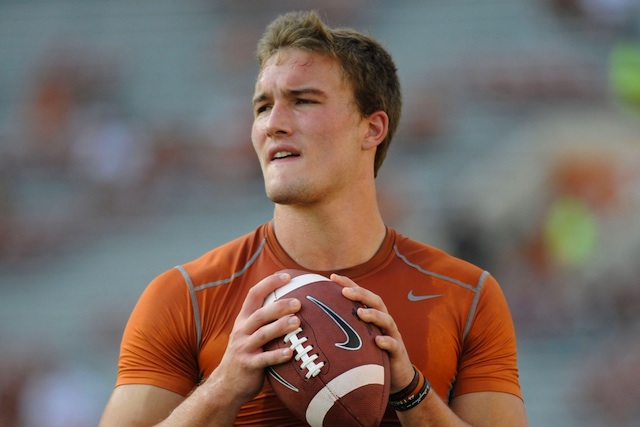
Texas QB David Ash is suffering from a concussion and will miss Saturday’s game against BYU. (Image courtesy of USATSI)
As media, it’s easy to try and tell an athlete what they should be doing instead of letting them live their own lives. When it comes to intercollegiate athletics, it is way too easy to assume this hectoring, lecturing pose.
With that being said, I’m probably about to adopt this pose with the very next sentence:
David Ash, it might be time for you to retire.
The Texas Longhorn junior quarterback is currently suffering from a recurrence of concussion-like symptoms after taking a hit during the first quarter of Saturday’s 38-7 victory over North Texas. Ash initially suffered a concussion during last season’s 40-21 loss at BYU, and re-aggravated it during a victory against Kansas State. Ash was granted a medical hardship waiver to give him two more years of eligibility.
This is a bit of a blow to the Longhorns on the field, as untested but talented sophomore Tyrone Swoopes will take over for Saturday’s game against BYU. The larger issue, though, is with Ash going forward. Texas’s medical staff is apparently going to meet with Ash and his family to determine his future.
It can be hard for athletes of any age to be told that they might want to consider hanging it up. A competitor will want to play until he himself knows that he can no longer play. Often, though, the player is the last one to recognize that he can’t do it anymore.
With regards to head injuries, it becomes even more complicated. Add in the fact that this is not a true professional, major league athlete but a person, that while 22 years of age, is still under the aegis of an institution of higher education.
The institution has a duty to protect the student athlete. Additionally, there is a responsibility in this day and age to ensure that the student athlete is going to be able to be a truly productive citizen in the future, and that he or she should be able to live their life to the fullest after their career as an intercollegiate athlete is complete.
And while the data about head injuries and the resulting long-term effects is still being collected and evaluated, it seems to me that limiting the future possibilities of head injuries by ending a career might be the safest route to take—even though it is the least satisfying for all involved.
The fact that Ash was able to recognize something was wrong and called to disclose it instead of trying to hide it is good. Yes, there is a chance that Ash can recover from this latest concussion and be able to finish the season without any further residual effects. But are the odds of that happening truly worth the risk of the potential long term damage that Ash could face?
Make Ash a graduate assistant, or special assistant, or whatever is allowed by NCAA policy so that he can still be part of the program in some capacity. It would allow him to still be connected to the program and be a part of the change that is happening.
But letting him take the field, while it may be something he wants to do, is not the best thing he can do for his long term future.
